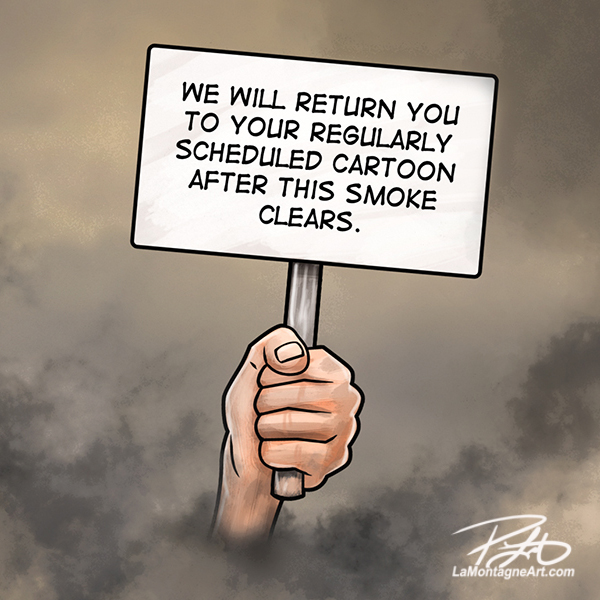
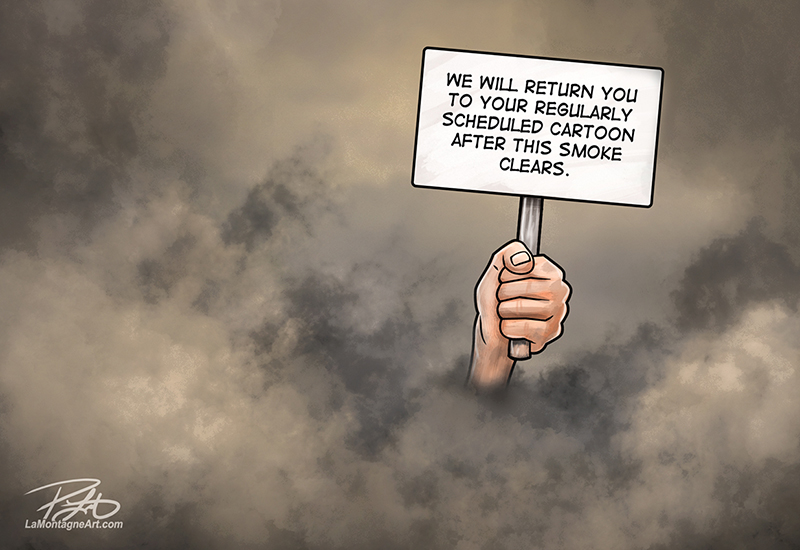
Canmore sits in a narrow valley framed on both sides by tall peaks. There are mountains everywhere you look.
As I write this, however, the smoke here is so thick that I can’t see any.
The Bow Valley becomes a bottleneck; the wind usually comes from the west, bringing the warm Chinooks in winter. So if the B.C. interior is on fire, we often get their smoke. Some summers, it’s a light haze with a faint campfire smell. But when it’s bad, we can’t open our windows. That’s tough to take when it’s 30 degrees Celsius, often at the peak of forest fire season.
This smoke has come from the north and east.
Alberta has fire activity each year, often in the northern part of the province, but in dry conditions, fires can pop up anywhere.
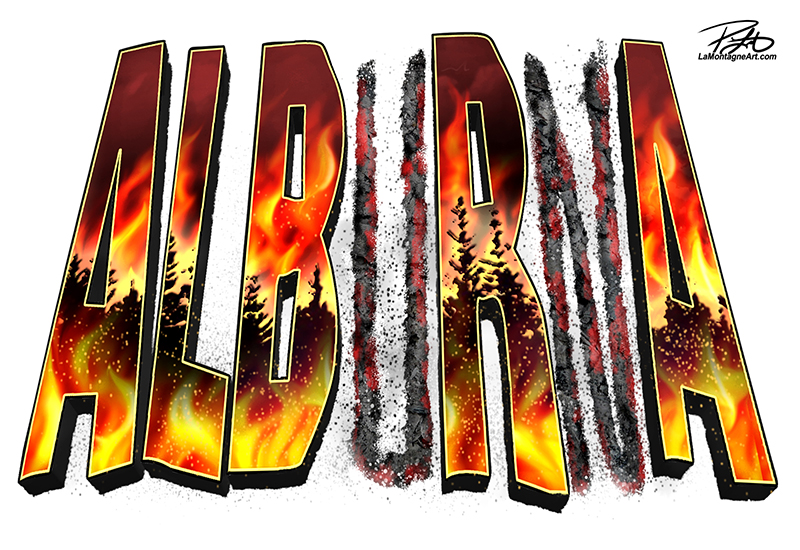
My wife grew up in a little town called Fox Creek. We usually have to tell people where it is, a 2.5-hour drive northwest of Edmonton. But the town has made headlines this month for the large fire that forced its evacuation almost two weeks ago.
Several towns and communities in northern Alberta have been evacuated as forest fire season started like a bomb this year and way too early. Shonna’s father and stepmother have evacuated, as have family and friends.
Until you’ve been told to pack quickly and get out of your home, you can’t understand the stress of it.
Ten years ago, we evacuated our condo for a once-in-a-lifetime (hopefully) flood and rain event. It caused a lot of damage to Canmore, Exshaw, High River and Calgary, among other municipalities. We were fortunate to return to our home as we left it after only three days. Unfortunately, I have friends who weren’t so lucky; they were out for weeks and months.
Before 2013, if you suggested an evacuation-level threat around here, most people would have assumed fire.
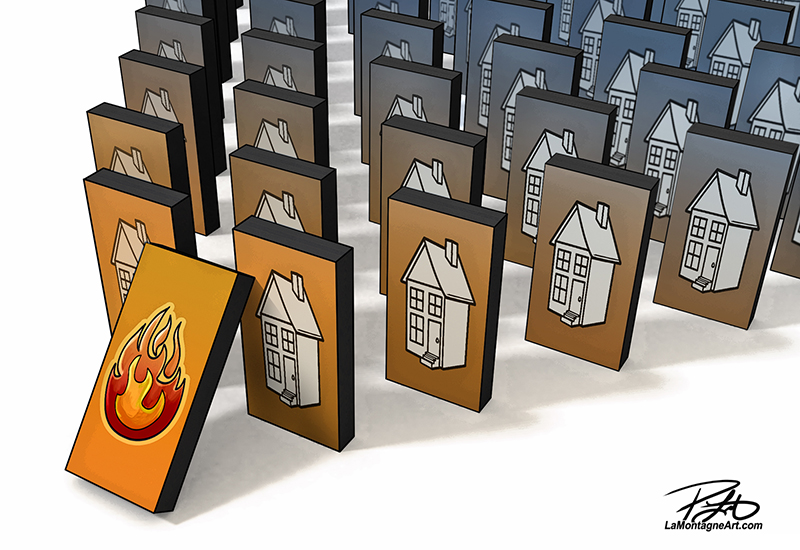 Even with that small level of experience, I can’t imagine the stress these recent fire evacuees are enduring. Two weeks out of your home, watching the fires on the news as they get closer, often from hours away in shelters or homes in unfamiliar communities, not knowing when or if you’ll be able to return.
Even with that small level of experience, I can’t imagine the stress these recent fire evacuees are enduring. Two weeks out of your home, watching the fires on the news as they get closer, often from hours away in shelters or homes in unfamiliar communities, not knowing when or if you’ll be able to return.
Firefighters from all over Canada and the U.S. have arrived to help, Canadian Armed Forces members have been deployed, and volunteers and homeowners are working in challenging situations to save homes, towns and livelihoods.
From the B.C. Wildfire Service, “Most wildfires in B.C. are started by lightning strikes. When lightning strikes an object it can release enough heat to ignite a tree or other fuels.”
“The most important thing about human-caused wildfires is that they are preventable. The easiest way to fight a wildfire is to prevent it from starting. Humans start wildfires in several ways, either by accident or intentionally. For example: open burning, vehicle and engine use, industrial activity, fireworks, sky-lanterns, outdoor flame lighting, discarding burning items (cigarettes), arson.”
 Wildfires are destructive enough. But what bothers me most is how so many use these disasters to further their agendas, political or otherwise.
Wildfires are destructive enough. But what bothers me most is how so many use these disasters to further their agendas, political or otherwise.
One of the big reasons I left social media was the overabundance of speculation and conspiracy theories that pollute every situation.
While these fires are raging, Alberta is in a provincial election. It’s part of my job to draw editorial cartoons on these issues, so I must follow this emotionally charged right vs. left conflict.
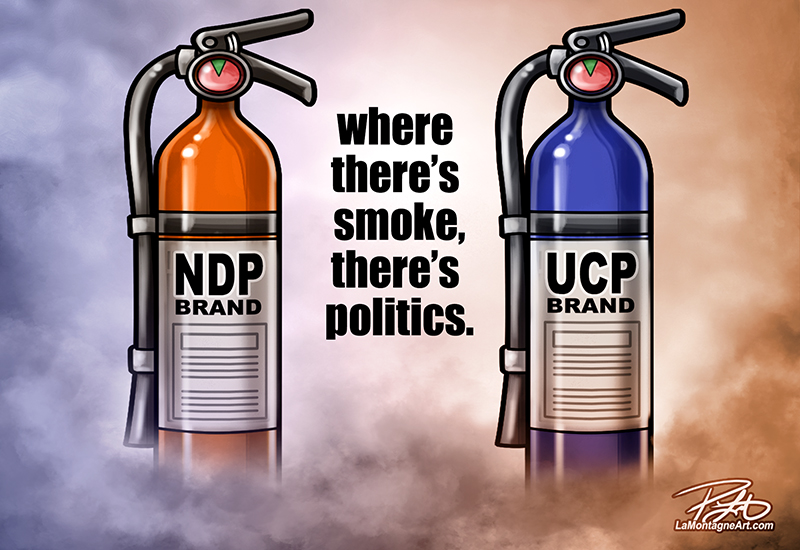 Some supporters of BOTH political parties accuse the other of deliberately starting these fires to win votes. People in the energy sector are accusing environmentalists of starting fires to destroy the oil patch. Climate change activists use the fires to trumpet their agendas, and deniers share cherry-picked links to debunk them.
Some supporters of BOTH political parties accuse the other of deliberately starting these fires to win votes. People in the energy sector are accusing environmentalists of starting fires to destroy the oil patch. Climate change activists use the fires to trumpet their agendas, and deniers share cherry-picked links to debunk them.
Political candidates are falling all over themselves to look serious, compassionate and concerned in front of any camera they can find while accusing their opponents of grandstanding and opportunism for the same behaviour.
Meanwhile, everybody else shares these links, videos, and photos so they can feel like they’re important or part of the story.
Clearly, we learned nothing from the pandemic.
 Amid all this noise, people out of their homes haven’t had a good night’s sleep in weeks, they’re unable to work, their kids are out of school, and whatever problems they already had are compounded. They’re scared, vulnerable, and feeling helpless. Their world is falling apart, and they can do nothing about it.
Amid all this noise, people out of their homes haven’t had a good night’s sleep in weeks, they’re unable to work, their kids are out of school, and whatever problems they already had are compounded. They’re scared, vulnerable, and feeling helpless. Their world is falling apart, and they can do nothing about it.
Rather than provide solace, online armchair quarterbacking and political theories only add to their stress.
Everybody knows life is more important than possessions. But it provides no comfort to tell a senior who worked their whole lives for the things that symbolize their safety and security that they can always replace it. Unless you’re physically helping them rebuild their homes and replace their furniture, dishes, clothing, vehicles, electronics, and memories, telling them ‘it’s just stuff’ accomplishes one thing.
It proves you’re an asshole.
If your dinner on the stove suddenly ignites, you don’t grab your phone and record a TikTok video. You don’t check for appliance recalls or dissect the political leanings of the CEO of the company that made the frying pan. You don’t share a Facebook post that the timing of this kitchen fire seems awfully suspicious since you usually don’t eat dinner until later. You don’t start a Tweet thread that PETA has been sabotaging chicken feed at the hatchery to make poultry catch fire more easily.
And you certainly don’t pour gasoline on it.
First, you put out the fire.
Everything else can wait.
____
©Patrick LaMontagne 2023

